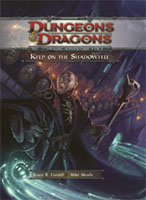The following thoughts contain minor spoilers for Keep on the Shadowfell. If you don’t want to be spoiled, don’t read it. And if you’re in my gaming group then you definitely shouldn’t be reading it.
THE THREE CLUE RULE
At the beginning of May I wrote a lengthy essay on the subject of scenario design and the Three Clue Rule:
For any conclusion you want the PCs to make, include at least three clues.
Basically, the idea is that every chokepoint in your adventure design (the points where the PCs must do X or be unable to proceed) are all potential points of failure: If the PCs fail to do X at any one of those points, the adventure will grind to a frustrated halt.
There are two ways to deal with such chokepoints: Either you can railroad your PCs through them (a “solution” that I find drastically unappealing) or you can design alternative paths through the adventure. And in my experience, designing three alternatives results in a sufficiently robust design so that the players will never find themselves clueless.
Probably the most common problem with published adventures are their chokepoints — they’re usually riddled with them, creating countless pitfalls for the DM to overcome. So the first thing I typically do when looking at a published adventure is to track the flow of the adventure: How do the PCs get from one point in the adventure to the next? Once I’ve identified the chokepoints, I’ll start designing alternative paths until I’ve satisfied the Three Clue Rule.
The flow of Keep on the Shadowfell was particularly baffling for me. For example, as the name of the adventure might suggest, the PCs are supposed to eventually go to the Keep. But there are only three ways that will happen:
(1) You can use the adventure hook which basically tells the PCs “you’re coming to Winterhaven in order to investigate the Keep”. But, if you do that, it’s very likely that the PCs might decide to ignore the kobold threat and go directly to the Keep… which is designed for higher level play and will prove rather deadly for 1st level characters.
(2) The PCs can succeed at a Religion check to identify a holy symbol of Orcus, conclude there’s a cult active in the area above and beyond the kobold tribe, and then… rewrite the adventure so that the PCs can learn that the Keep was once a site of Orcus worship without first asking a specific character about the Keep separate from the Orcus worship.
(3) The players read the title of the module and conclude that they should find out about this Keep.
Similarly, there’s encounter A4: Dragon Burial Site. As far as I can tell, the only way the PCs will ever go to the dragon burial site is if you use the “Missing Mentor” adventure hook. If you don’t use that specific hook, the PCs will never have any reason to look for Douven Stahl — which is the only reason they would ever go looking for the dragon burial site. (Which isn’t much of a loss, admittedly, since in the original adventure there is no useful information to be gained at the site.)
So these problems needed to be fixed. In addition, I had a desire to remove the CRPG-like quest-givers in Winterhaven, which meant that I would need a more robust Three Clue Rule design for the kobold sections of the adventure, too.
REVELATIONS
Although this is one of the last remix essays I’m writing for Keep on the Shadowfell, it’s actually describing the first steps I took in revising the module. And the very first step I took was to identify and list the revelations the players would need in order to move through the adventure.
First, there are three location-based revelations. The adventure basically takes place in three locations: The kobold lair; the dragon burial site; and the Keep on the Shadowfell. The PCs need to (a) identify these as places they should go; and (b) go there.
Second, there are two revelations which allow the PCs to figure out what’s going on: They need to know what the cult of Orcus is and they also need to discover the existence and purpose of Kalarel’s ritual. These revelations are less important because the adventure can continue even if the PCs aren’t entirely sure what’s going on — in other words, these aren’t actual chokepoints — but my players get a big kick out of discovering hidden lore. And, also, knowing these facts will help raise the stakes of the adventure.
Starting tomorrow I’ll break down how I applied the Three Clue Rule to each of these revelations.













